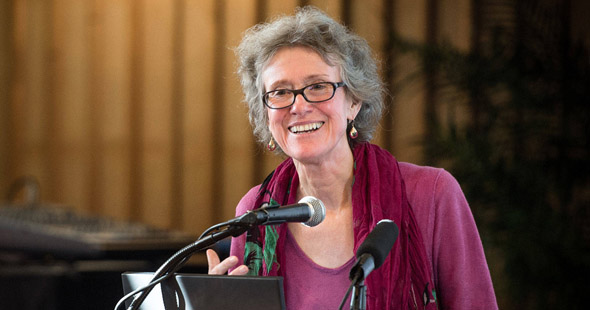MENS ET MANUS AMERICA EVENT
At MIT, sociologist Arlie Hochschild discusses U.S. political divisions
Recommends three pillars of action for finding common ground

"Hochschild tries to scale an 'empathy wall' to understand her interviewees’ perspectives on the interplay of politics, business, and culture. To me this fits beautifully with MIT's desire to have an impact, and to bring heart into the equation — mind, hand, and heart."
— Catherine Gamon, Director, Student Life Office
Acclaimed sociologist and bestselling author Arlie Hochschild shared her insights on the current rift in American politics during the second event hosted by Mens et Manus America, a new MIT initiative focused on examining the social, political, and economic issues exposed by 2016's presidential election.
"Strangers in Their Own Land: A Conversation with Arlie Russell Hochschild" drew nearly 200 people to Bartos Theater at MIT on March 23, 2017. Structured as a conversation between Hochschild and Ezra Zuckerman Sivan, deputy dean of the MIT Sloan School of Management and one of the initiative's organizers, the event centered on Hochschild's most recent book, Strangers in Their Own Land: Anger and Mourning on the American Right (The New Press, September 2016).
A finalist for the 2016 National Book Award, Strangers in Their Own Land is the story of Hochschild's journey to understand the views of America's political right wing — a project she undertook by spending five years interviewing deeply conservative residents of Louisiana.
"Hochschild tries to scale an 'empathy wall' to understand her interviewees’ perspectives on the interplay of politics, business, and culture," said Catherine Gamon, director of the Student Life Office, who introduced the event co-sponsored by Sloan and the MIT School of Humanities, Arts, and Social Sciences. "To me this fits beautifully with MIT's desire to have an impact and to bring heart into the equation — mind, hand, and heart."
Paradoxical political views
Prompted throughout the lunchtime event by questions from Zuckerman, Hochschild told the MIT audience that Strangers in Their Own Land was inspired by her 2006 realization that government would not be able to address major social issues without first tackling "the stone in the road" — opposition to federal action from America's rapidly growing right wing.
A professor emerita of sociology at the University of California–Berkeley, Hochschild said she wanted to explore the "red state paradox," the fact that hatred for the government is strongest in the very states that benefit the most from federal assistance — including Louisiana, which received 44 percent of its budget from federal aid in 2012, yet voted overwhelmingly for Donald Trump in 2016. Distrust of government runs so deep in Louisiana that even environmental regulations are often opposed. Why?
To answer this question, Hochschild spent time with Louisiana residents — at churches and political meetings, in their homes, and even out fishing. Along the way, she got to know Tea Party supporters like Mike Schaff, an oil rig engineer and avid outdoorsman, who helped her understand what she calls the "deep story" behind voting patterns that can appear paradoxical.
The deep story
This "deep story" lies below layers of resistance to the government — including an aversion to being told what to do by the "finger-wagging, moralizing North," as well as an assumption that the federal government is no better than the state government, which in heavily polluted Louisiana "does the moral dirty work of the oil industry," Hochschild said. Accepting federal help, even when needed, is also at odds with a longstanding cultural value of endurance and resilience, of being self-reliant in the face of hardship.
The deep story of the people she interviewed, Hochschild said, is of a group of people who feel alienated and betrayed. They feel they have played by the rules, worked hard, and spent their lives waiting in line for the American dream only to find that — in their view — other people are "cutting in" ahead of them, in particular African-Americans and women, who, through federal action, now have access to opportunities that once belonged almost exclusively to white men.
Hochshild noted that while this group feels genuinely aggrieved, there is also a complex racial dimension of the picture they do not perceive: "This group of Americans is not seeing the blacks behind them in line, and they don't see whites as line-cutters."
The French political theorist Alexis de Tocqueville wrote, "The greatness of America lies not in being more enlightened than any other nation, but rather in her ability to repair her faults."
Finding common ground
Given this disconnect, Zuckerman asked, what is the best way for people in the MIT community to reach out and have an impact? Hochschild said she sees the opportunity for "three pillars of activism."
The first action, Hochschild said, is to defend core American values such as "the very principle of checks and balances [and] the independence of the press and the judiciary." A patriotic embrace of the principles of democracy "is a dead center issue," she said.
Secondly, Hochschild recommends that the Democratic Party reformulate its platform to address the legitimate grievances of American working class voters. "I think we've got a blue state paradox. How come the Democratic Party, the party of the working class, is being abandoned by the white working class?" she asked. Focusing on crossover issues such as renewable energy and reducing the prison population might enable the party to reclaim voters who cast ballots for Obama in 2012 but voted for Trump in 2016.
And third, she advocates reaching out across partisan divides. "Get people on the right and left together and see if you can find common ground. That's a start," Hochschild said, noting that too often liberals assume that the nearly half of Americans who voted for Trump are simply racists. "There are hard-core racists, and they are his core, but [Trump voters] are not a monolithic group," she said. Hochschild proposes regional exchange programs and informal living room conversations in which people look for areas of agreement to help address the nation's "crisis of division."
Ultimately, patriotism shouldn't be partisan, Hochschild said. "I think you can love your country by looking at what de Tocqueville said." To paraphrase: "It's not that the United States is great because it's great, it's because you're a bunch of pragmatists and you fix the problems."
— • —
About Mens et Manus America
In the wake of the 2016 presidential election, it is clear that there are major long-term social, political, and economic issues in America that require close attention. In response, members of the MIT community have launched Mens et Manus America, a nonpartisan initiative that is convening a series of research-informed lectures and discussions to explore these issues.
We are asking: What can MIT do to help address current challenges in the United States., and bolster the health of our democracy? How can we use research and rigor to inform our decisions about engagement, both as citizens and as leaders of organizations? The initiative is sponsored by the MIT School of Humanities, Arts, and Social Sciences and the MIT Sloan School of Management. Join us as we frame the issues and generate ideas for making a positive impact.
Suggested links
Mens et Manus America Initiative
Arlie Russell Hochschild
Strangers in Their Own Land: Anger and Mourning on the American Right
About the book | New York Times review
Agustín Rayo
Professor of Philosophy, Associate Dean, MIT SHASS
Ezra Zuckerman Sivan
Siteman Professor of Strategy and Entrepreneurship, Deputy Dean, MIT Sloan
Catherine Gamon
Director, MIT Sloan Student Life Office
Archive Story: Mens et Manus America launches with film documentary
Mens et Manus America: Wiki Survey Page
21st Century Citizenship | MIT SHASS Resources for Understanding and Engagement
Op-Ed
How to declare war on coal’s emissions without declaring war on coal communities
"The move to clean energy is imperative. In the long run, that transition will create more jobs than it destroys. But that is no comfort to families whose livelihoods and communities have collapsed along with the demand for coal. We owe something to the people who do the kind of dangerous and difficult work my grandfathers did so that we can power our modern economy."
3Q Interview
Maria Zuber, daughter of coal country
MIT’s vice president for research describes how growing up in eastern Pennsylvania shaped her views on climate policy.

Story prepared by MIT SHASS Communications
Editorial team: Emily Hiestand and Kathryn O'Neill
Photograph of Arlie Hochschild by Paige Parsons '90